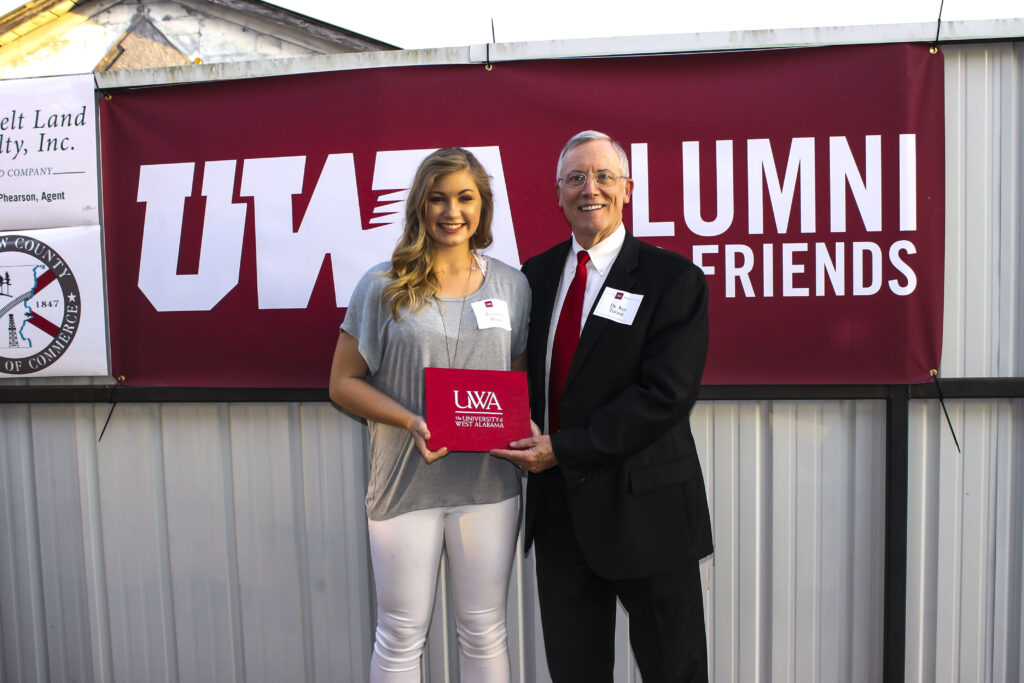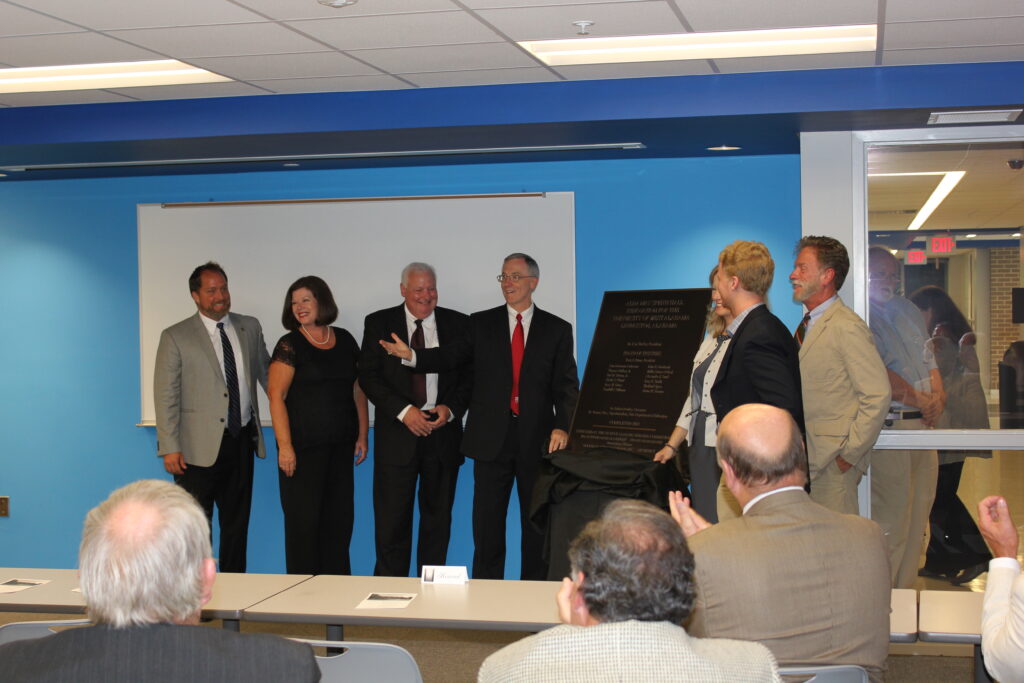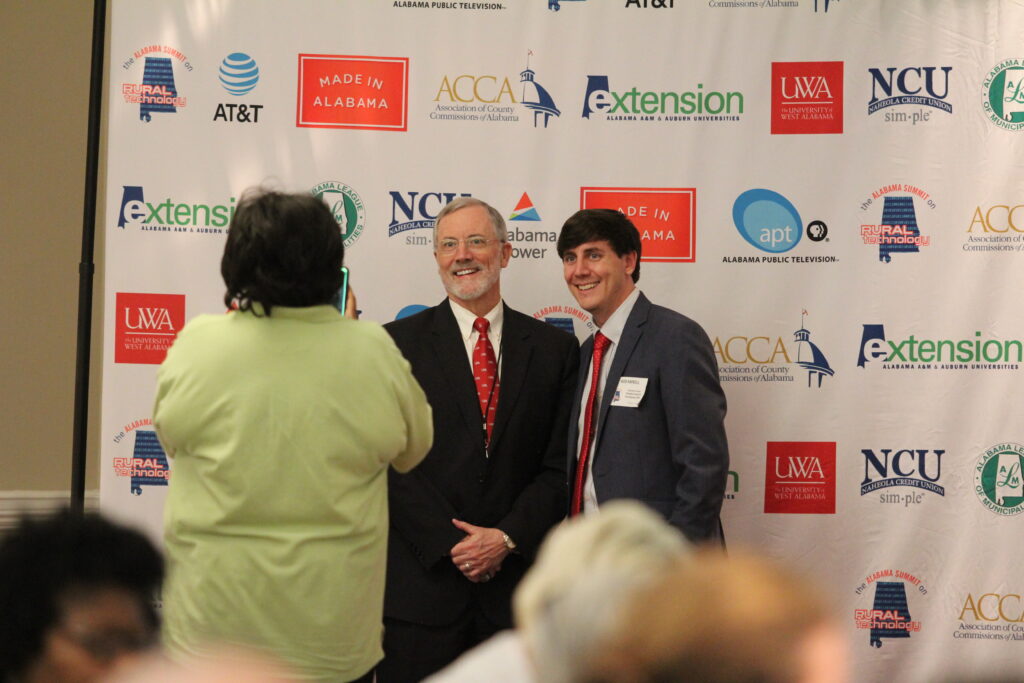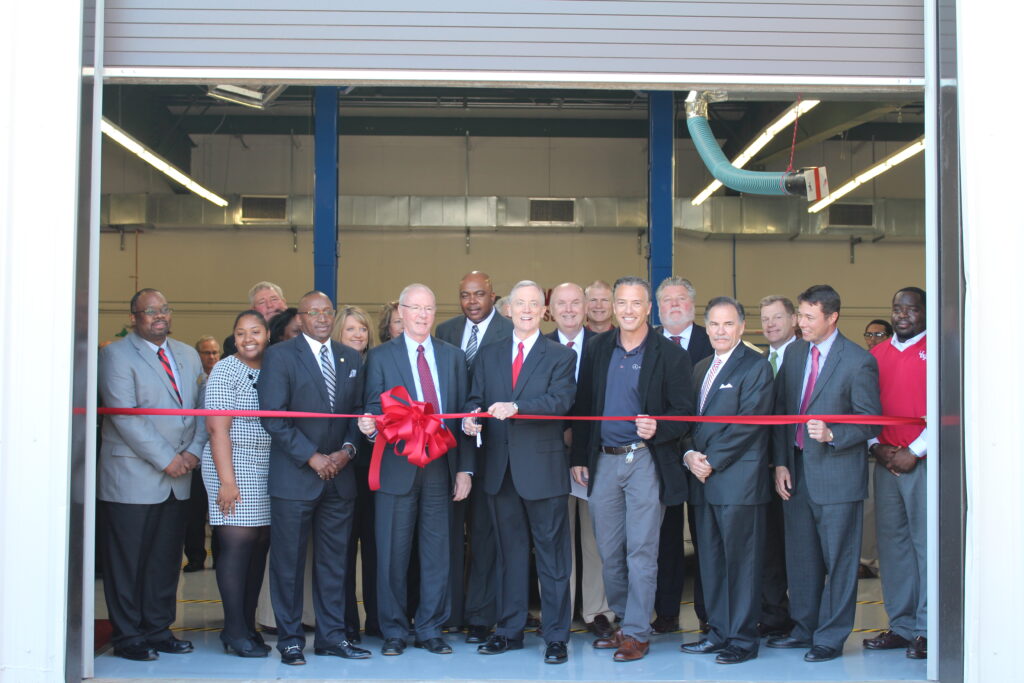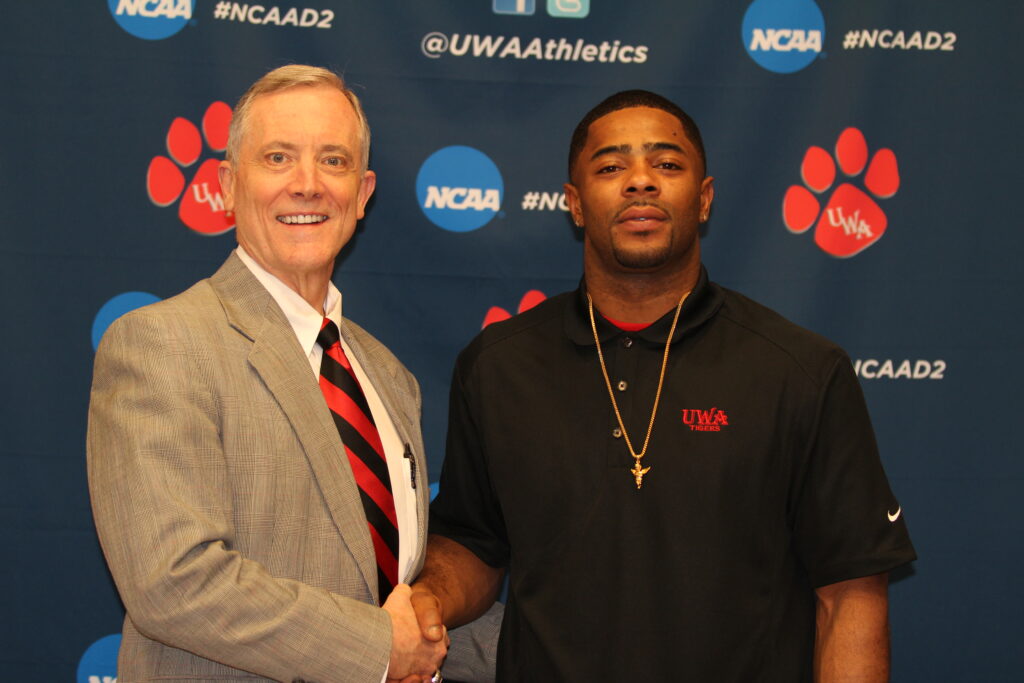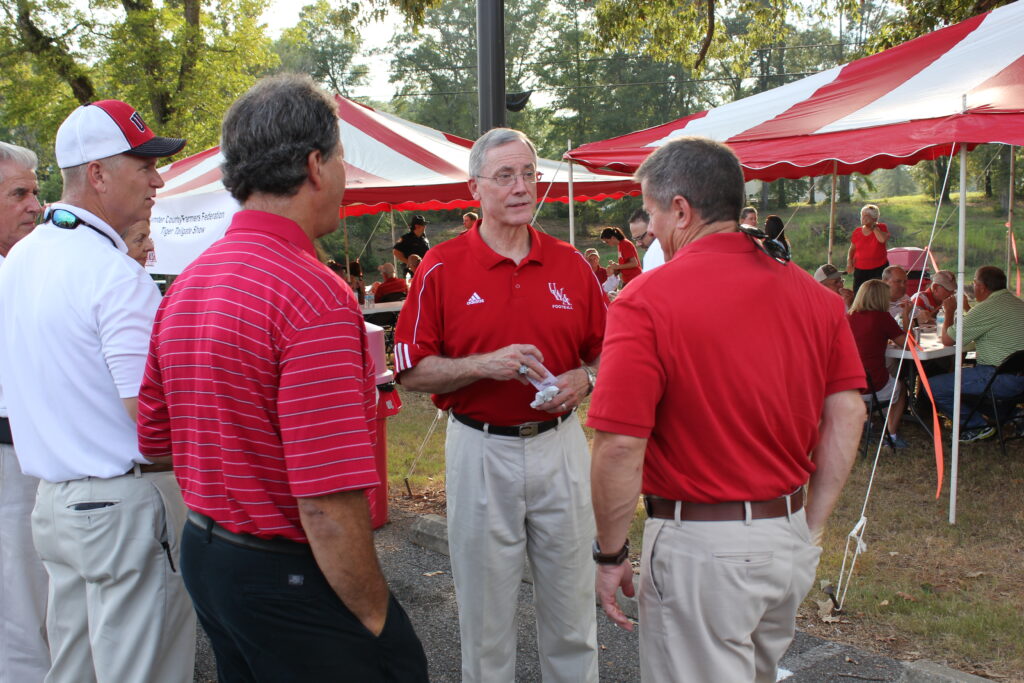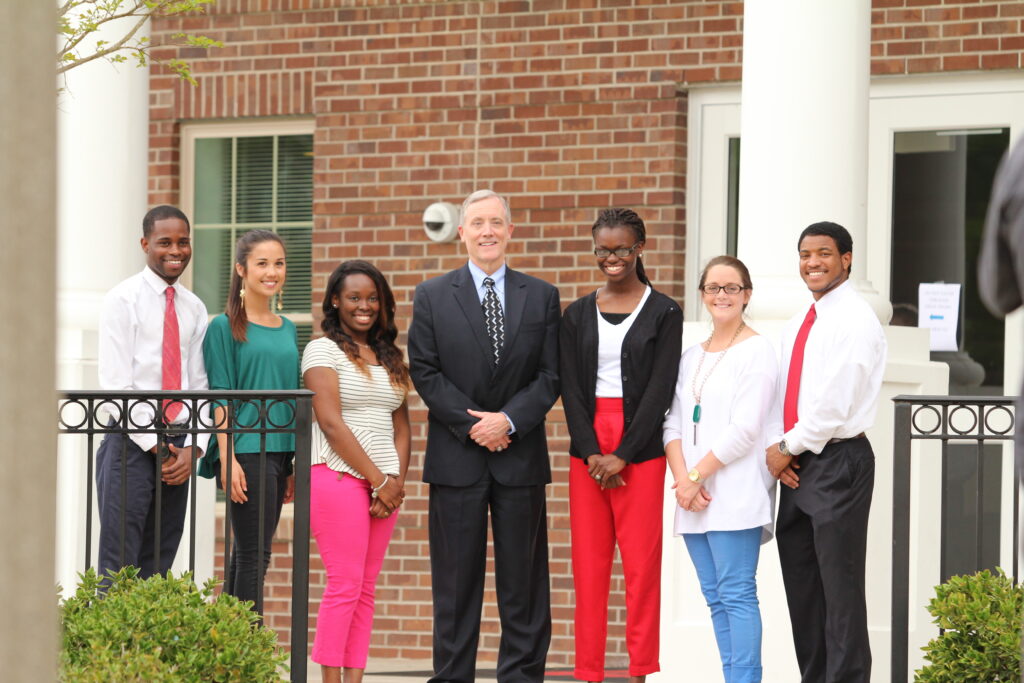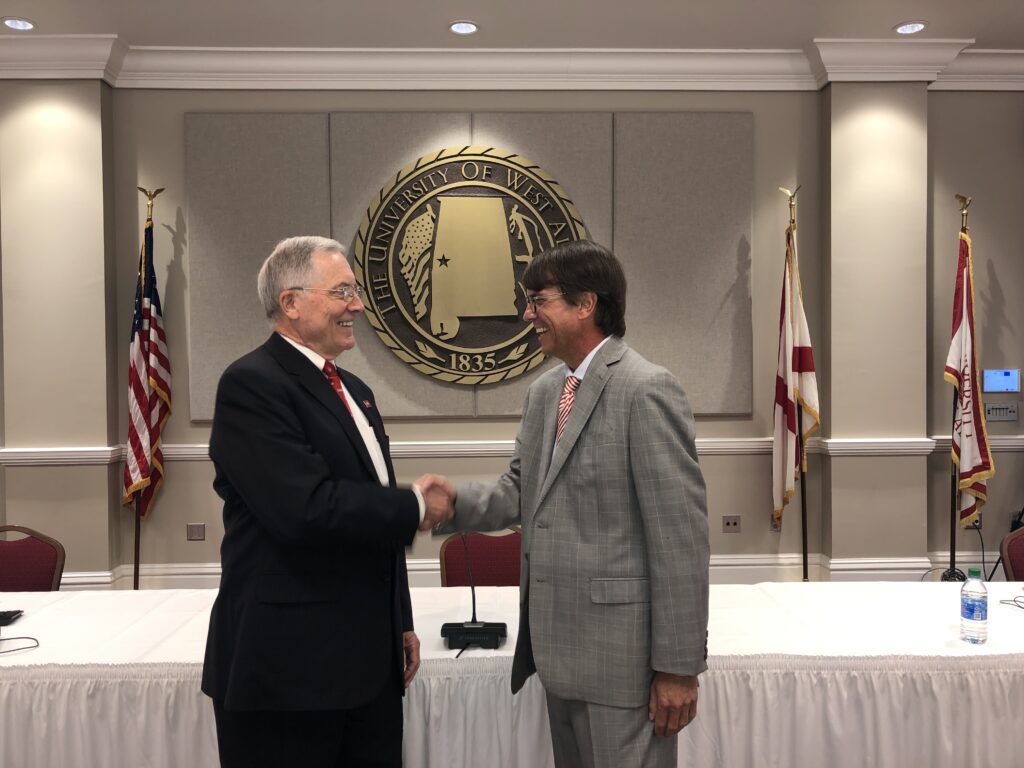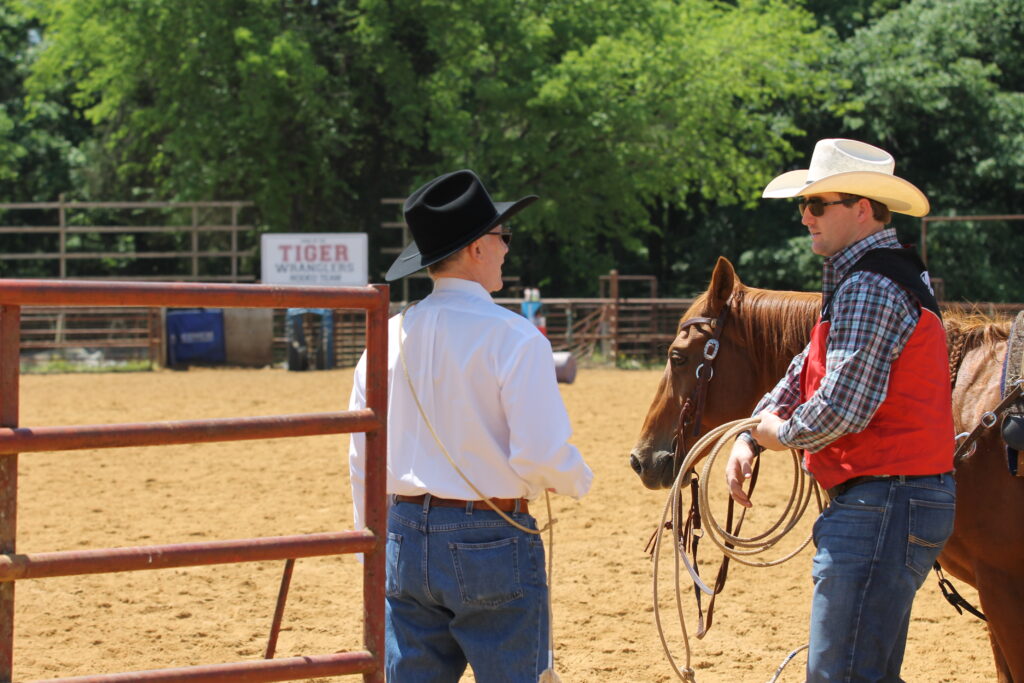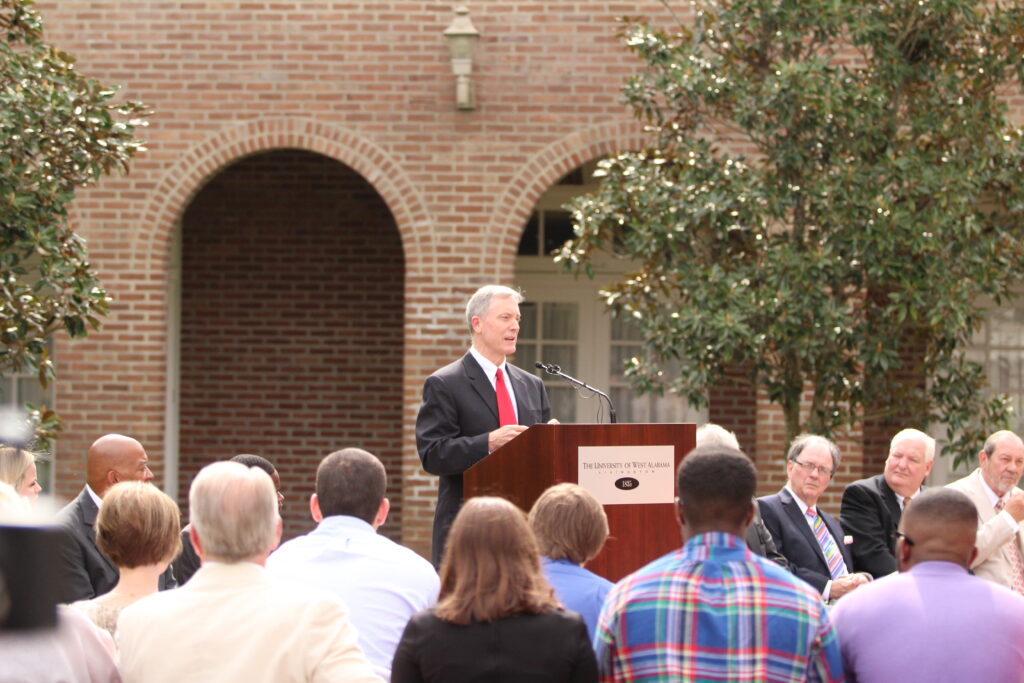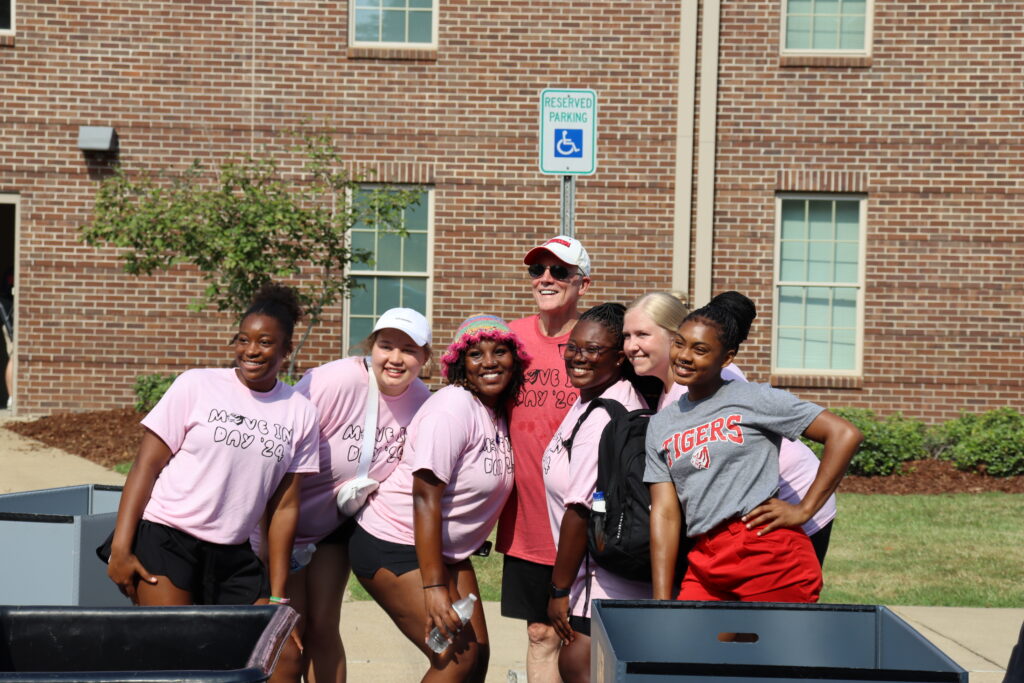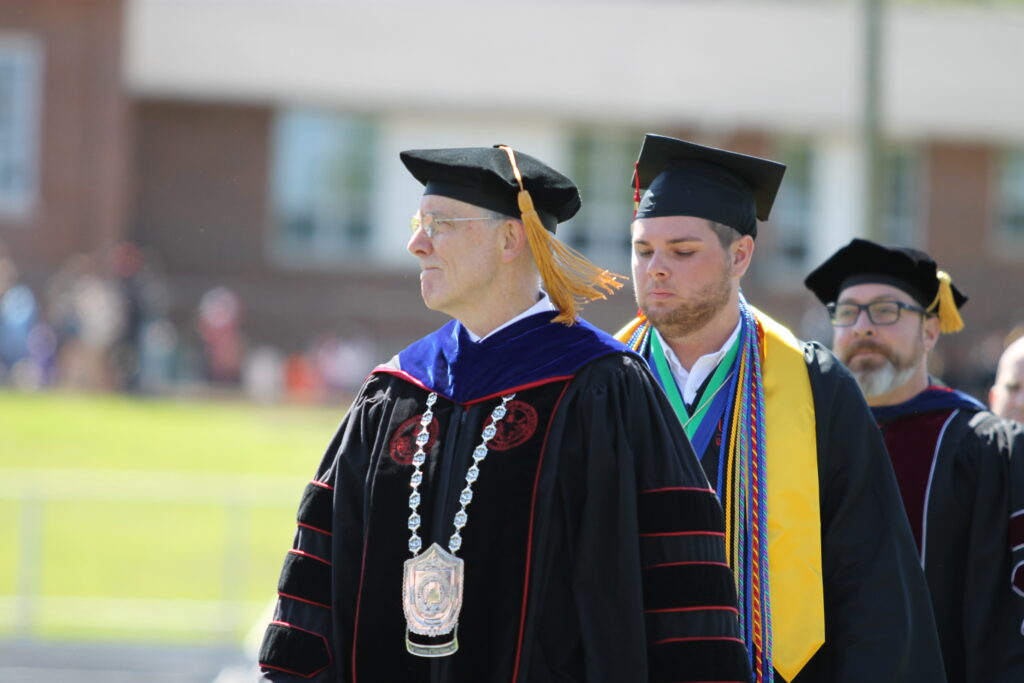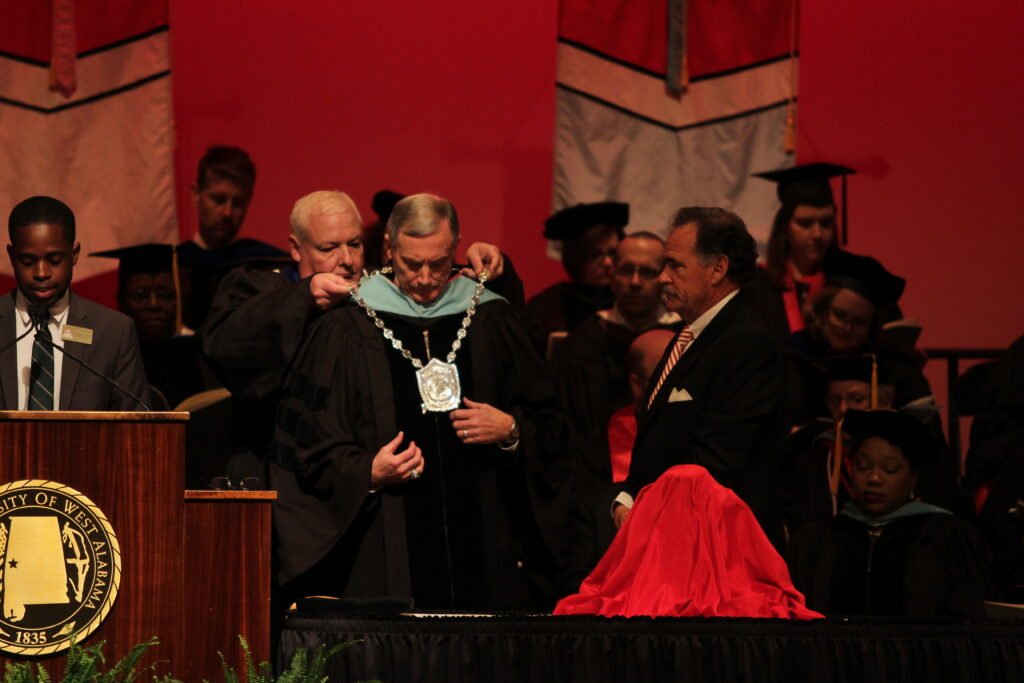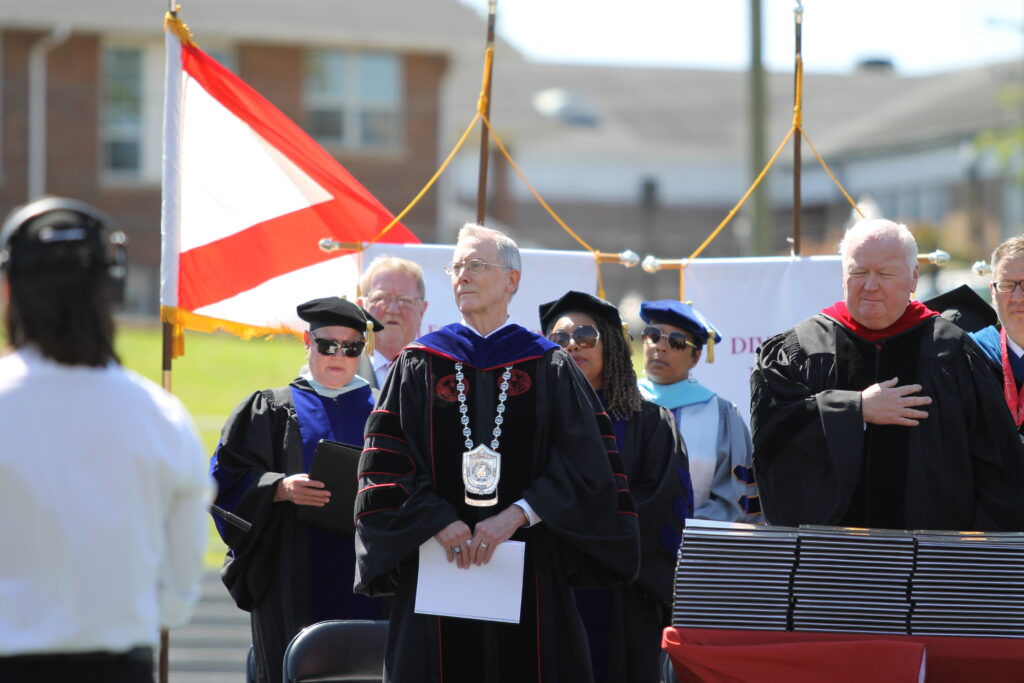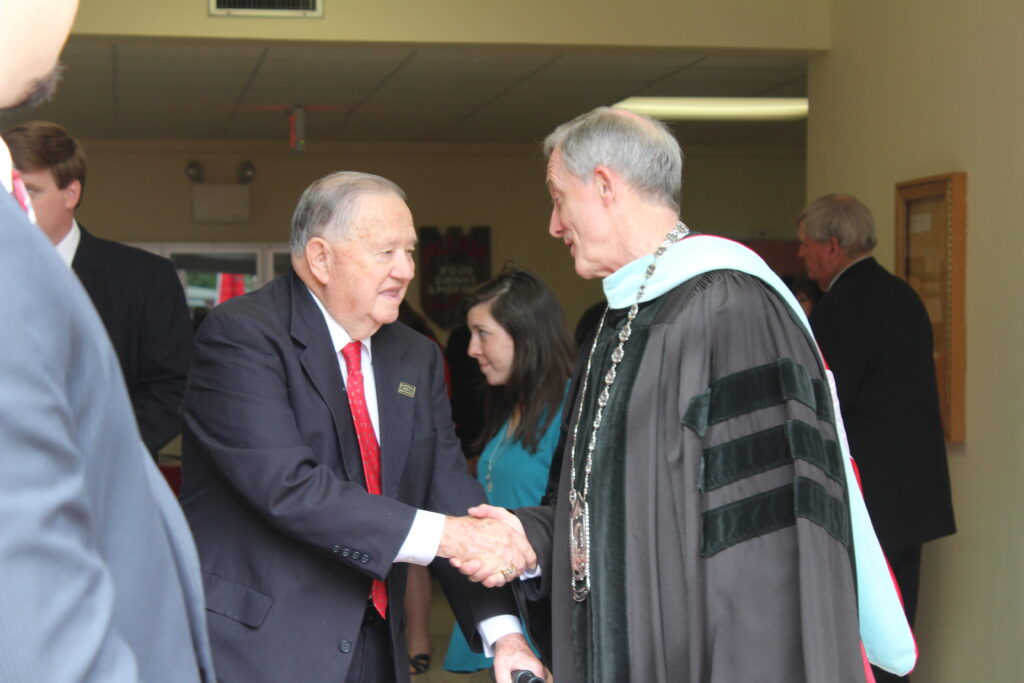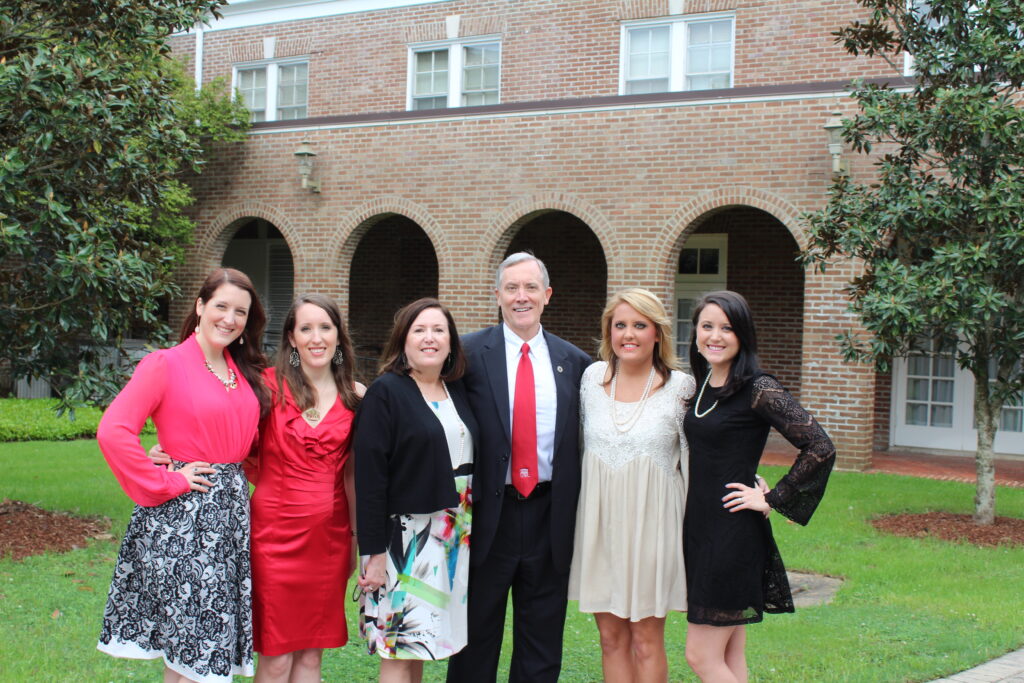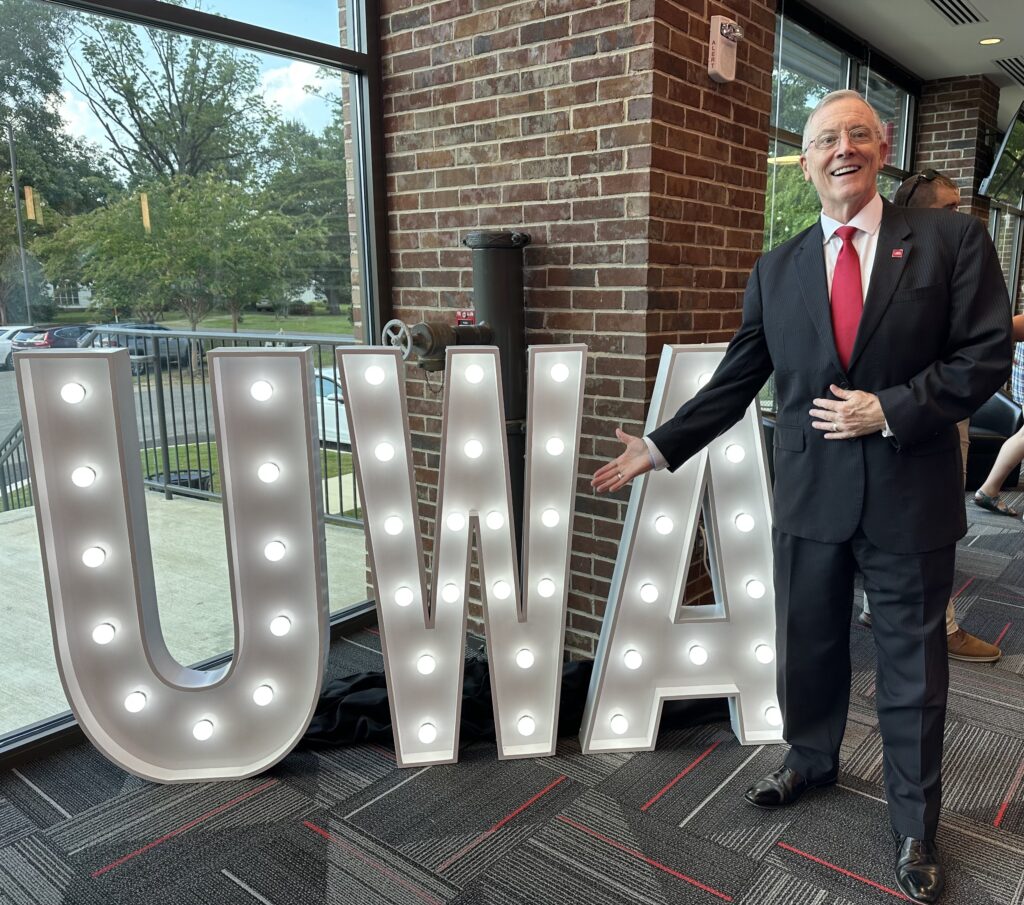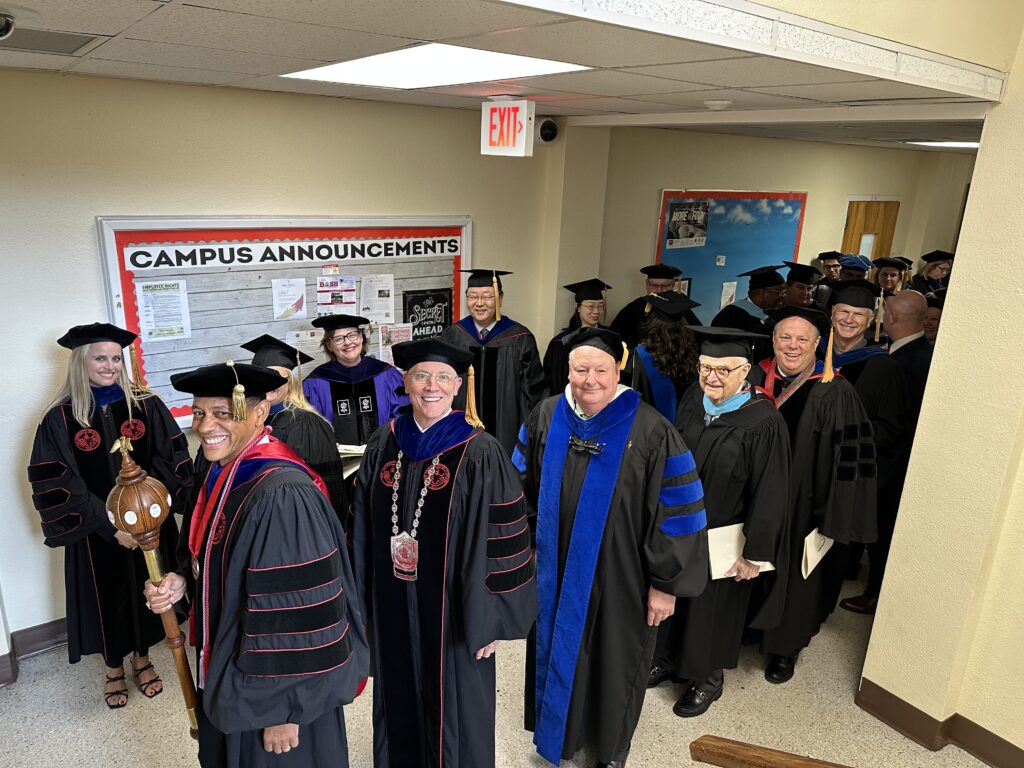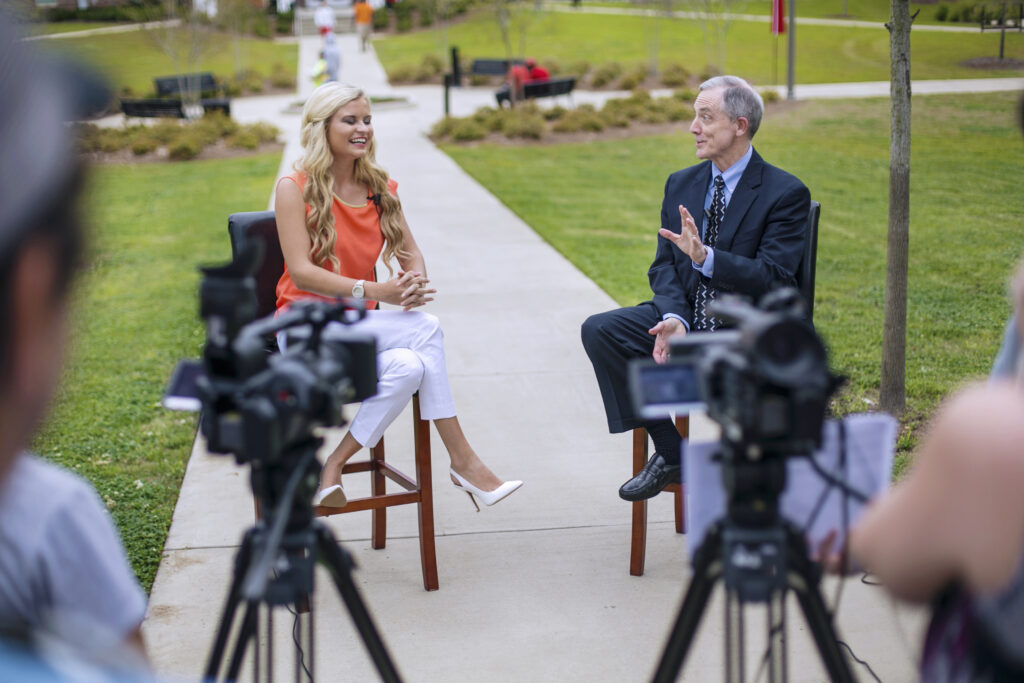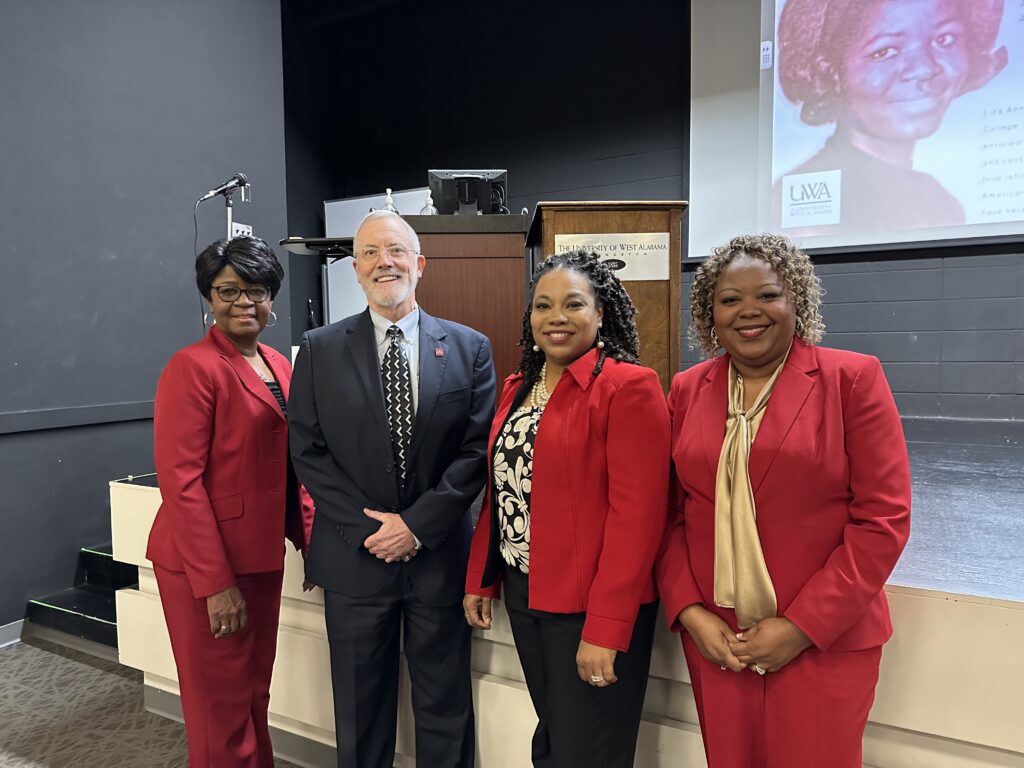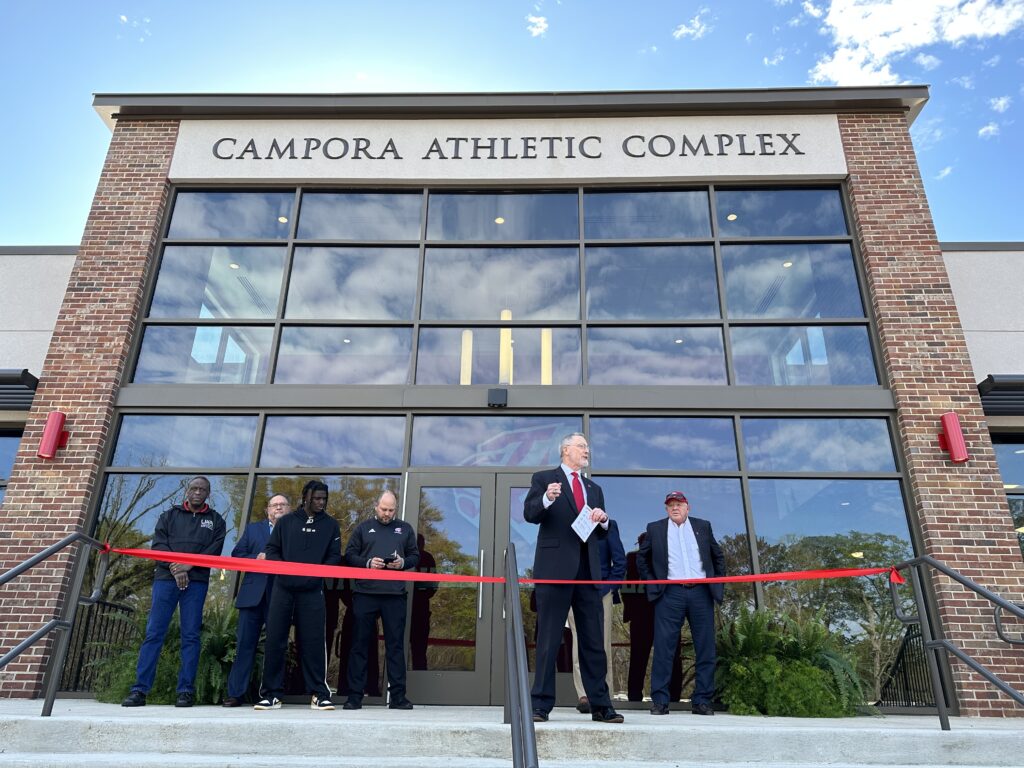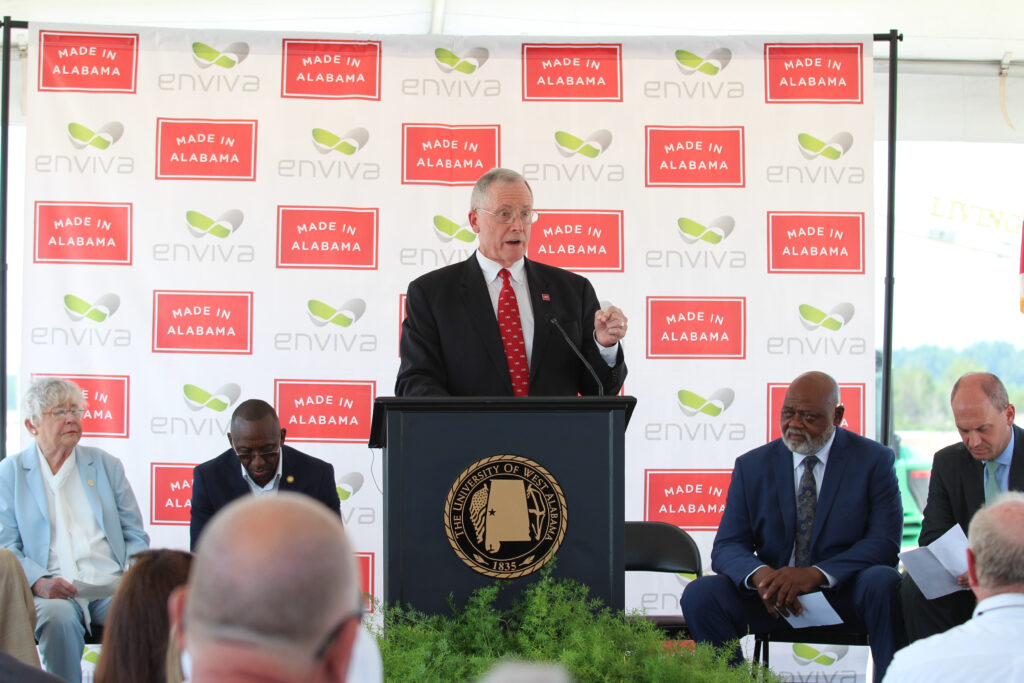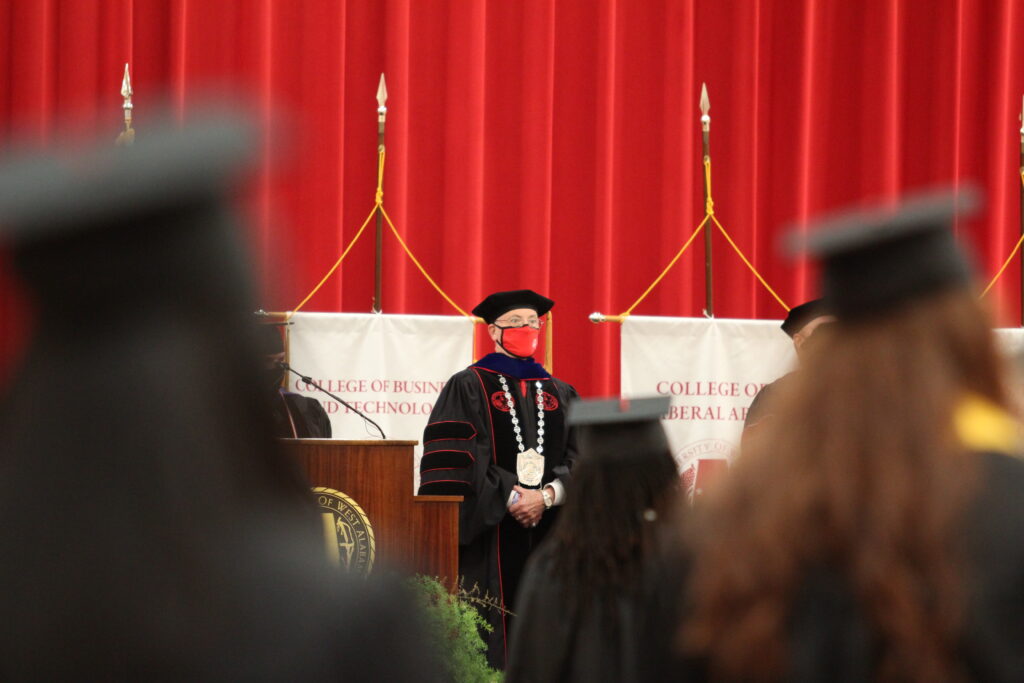Legacy of leadership culminates with President Emeritus honors
Story: Betsy Compton
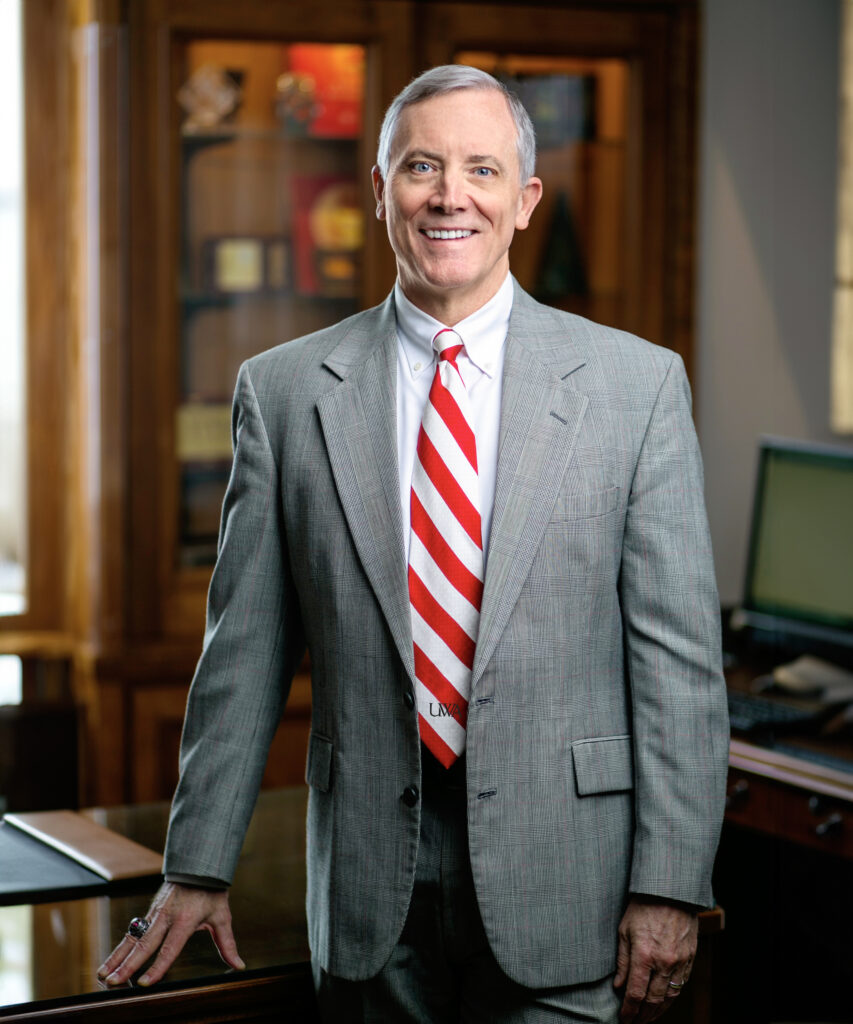
The last day of the year 2024 will mark the end of a chapter for the University of West Alabama, and it will mark the end of an era for outgoing President Ken Tucker. Having led the University for the past 10 years, Tucker will be retired on January 1, 2025, leaving a legacy of unprecedented growth and development.
Being tapped President Emeritus by the University upon his retirement, Tucker is the first in UWA history to receive this top honor brought forth on recommendation by faculty and voted unanimously by academic and administrative leadership.
If a legacy is defined by the long-lasting impact of events and actions during a given period, there is no question that Tucker’s leadership will be regarded as such. It is marked by significant achievements that reflect a strong commitment to as holistic an approach as anyone could envision a regional university having.
During Tucker’s tenure as president, UWA has experienced unprecedented growth that will leave an unmistakable positive impact on the region. Highlights include a 71 percent increase in overall enrollment and more than $70 million in capital projects transforming the campus map.
He has advocated locally and globally for the University’s ability to meet the educational needs of a growing region through leadership, economic and workforce development, and collaborations that build and strengthen communities.
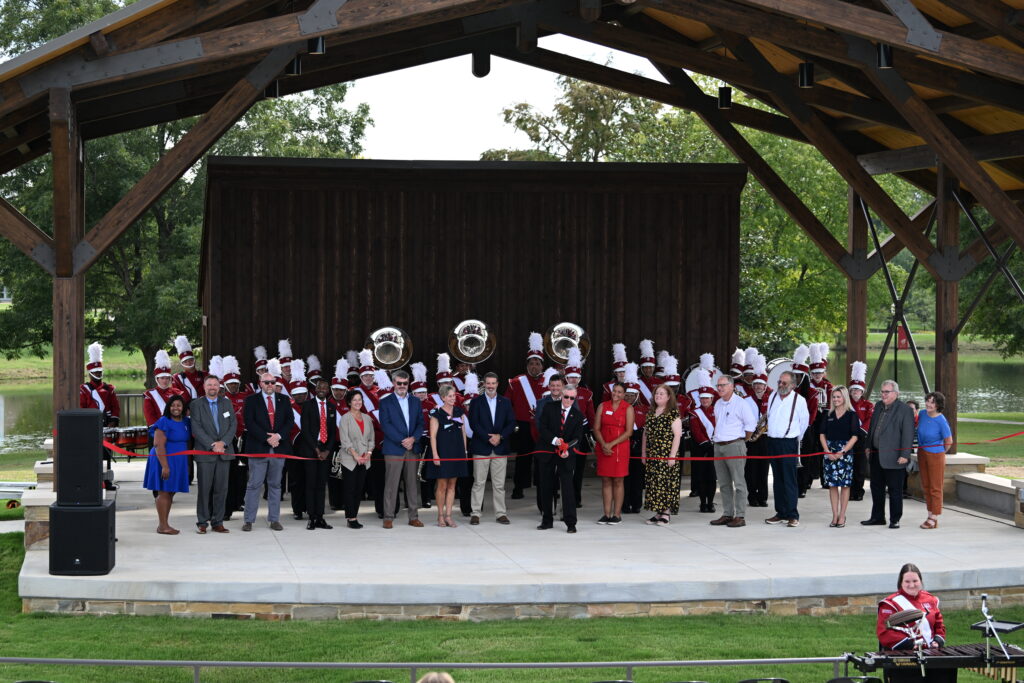
A birds-eye view of campus reveals an array of improvements designed to expand, enhance, and add campus facilities to better serve students, some being renovated interiors, and others new on the map, like the Campora Athletic Complex, a new track and soccer field, and the new amphitheater adjacent to the Student Union Building. Others are set to break ground in the coming months, like a $14 million student rec center that will be a cornerstone of recruitment and retention efforts.
Higher education has been a sea of uncharted waters over the last 10 years, and Tucker’s steering of the ship leaves the institution at record enrollment, sound fiscal stature, and an expansive list of successful initiatives.
CHARACTER TO LEAD
“When I interviewed for this position, I made only three promises,” Tucker said. “One was that you will not find anyone who will work harder than I will to make this university the best it can be.” Within this, he says, is a commitment to fostering an atmosphere of hard work, positive energy, respect, and collaboration.
“I have tried really hard to be fair and consistent and balanced in my decision making, and I think that’s critical,” he said. “I think that’s how you build trust, and I think that’s how people know if they want to work with you to make good things happen.”
In fact, a word that has been at the tip of his tongue throughout his administration is ‘collaboration,’ quoted countless times applauding the efforts of those who ‘work collaboratively’ or encouraging teams throughout campus to do so. He has been a proponent of collaboration both internally, urging cross-campus synergy, and externally, building partnerships that provide continued opportunities for students and thus strengthening the region and its economic viability.
For Tucker, every success experienced individually or collectively can be traced to a core truth that he says is the heart of his leadership philosophy.
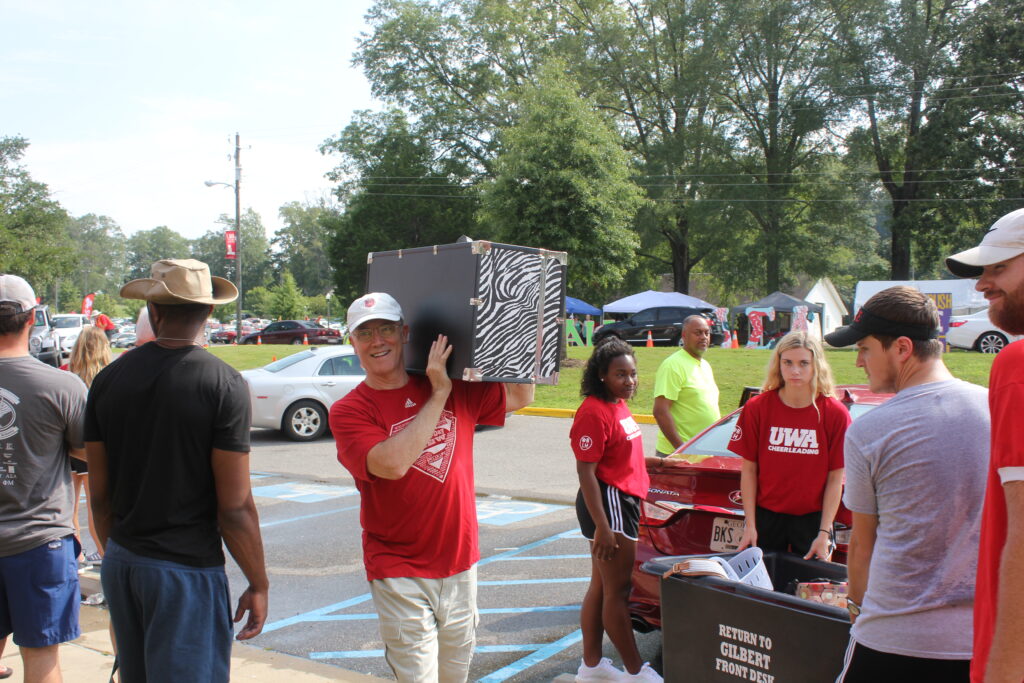
“The answer is relationships,” he asserts. “I honestly believe life is about relationships. None of us can be successful by ourselves. We need other people, we need to work in teams, together, collaboratively, in order to achieve true success. The key to success is relationships, and the key to relationships is trust. And trust is built through the combination of character and competence.”
Reflecting on his professional legacy, which requires reflection on his personal success, is somewhat circular in that the conversation consistently returns to achievements and accomplishments attributed to teams. This is because he tries to live by what he refers to as “abundance mentality.”
“In my view, it means you and I don’t have to compete to be successful. We can collaborate,” he says, again using the word so closely tied to his identity as a leader. “Think of the concept of a pie. Win-lose thinking is that, for one to win, the other must lose, or not get a piece of the pie. Win-win thinking, or the abundance mentality, says that we can work together and make the pie bigger so we both get a piece of the pie—we both achieve our goals.”
He could talk about effective leadership philosophy for days, he says, sharing a career’s worth of development and insight. Prior to being named president, he served as dean of UWA’s College of Business for eight years. Before that, his corporate roles included directing training and education for Weyerhauser Corporation’s North American operations, human resources at Whitfield Hospital in Demopolis, and also an earlier stint at UWA (then Livingston University) as a management professor and director of the Small Business Development Center and the Center for Business and Economic Services. He is a past president of the University’s Faculty Senate.
For many years, Tucker has provided leadership training to countless organizations, and through these he has helped some of the region’s most accomplished civic leaders, business and industry professionals, and elected officials develop their leadership skills.
EQUIPPING TO LEAD
“We want to provide the knowledge, skills, and abilities that students need to be successful in whatever career paths they choose,” Tucker said. “It’s important that they have all of these, and my hope is that I have modeled an example of striking a balance between character and competence that sets a standard for our campus, including our students who are developing as leaders, our employees who will serve and support our students, and our University as a whole, functioning in a leadership capacity for our region.”
What he offers as educational sessions to these groups is what he has set as a standard for the University community to model for students throughout their academic journey.
“I have the utmost confidence in our faculty and staff at UWA, and I see firsthand daily how devoted they are to our students every step of the way,” he added. “Every decision we have made over the last 10 years has been about how to make campus life better for our students or how to provide a better opportunity for them.
Tucker has emphasized a comprehensive approach to the student experience, expanding beyond the classroom to extracurricular and athletic programs that bolster their campus experience and allow their talents to be showcased. His emphasis on academic excellence among student-athletes has led to consistent increases in retention and grade point averages, placing them among the highest in the Gulf South Conference. UWA teams have earned conference championships every year of his tenure, as well as two back-to-back national championships in rodeo.
Tucker’s approach to campus decisions is fairly simple: “If it will help recruitment and retention, or help ensure campus safety and security, we will try to find a way to do it. That’s the bottom line of all our projects,” he said. “If it will help provide a better campus environment for our students and our employees, it has merit, and we have sought as many of those opportunities as we could.”
This approach has led decisions related not only to the physical establishments on campus, but the development of new initiatives and continuous improvement of others.
Services designed to guide students through every step of their journey and in their extracurriculars, combined with facilities and infrastructure to support students’ needs and aspirations have remained at the forefront for Tucker and the leadership team he has formed. This extends to efforts to better support those who serve UWA’s students—the faculty and staff—striking balance between the two. A perfect example is the commitment to minimizing expenses for students through seven consecutive years of freezing tuition, while providing across-the-board cost of living and merit pay increases to employees for six consecutive years.
“By managing our resources and striving to maintain a more balanced budget, we can be good stewards of the University’s resources without merely shifting a financial burden,” Tucker said. “As an employer, it is important to show people that their contributions are appreciated and valued so as to retain the high level of talent that we need to serve our students.”
MORE THAN A FOUR-YEAR
Through this broad perspective, Tucker’s administration has certainly looked beyond the typical four-year window of a college student’s journey. As he transitioned from his role as dean to the top seat at the University, he hearkened back to a theme prevalent in exit interviews with graduating students.
“An overwhelming percentage of our graduating students in the College of Business, around 85 percent at the time, said they wanted to stay in the area, loved the area and the lifestyle, but they needed better employment opportunities to do so,” Tucker recalled. “That really has been the impetus behind our emphasis on economic development and workforce development. We want to provide what students and employees alike need, so we have dedicated efforts to recruiting business and industry to the region, which will positively impact the standard of living and quality of life for all.”
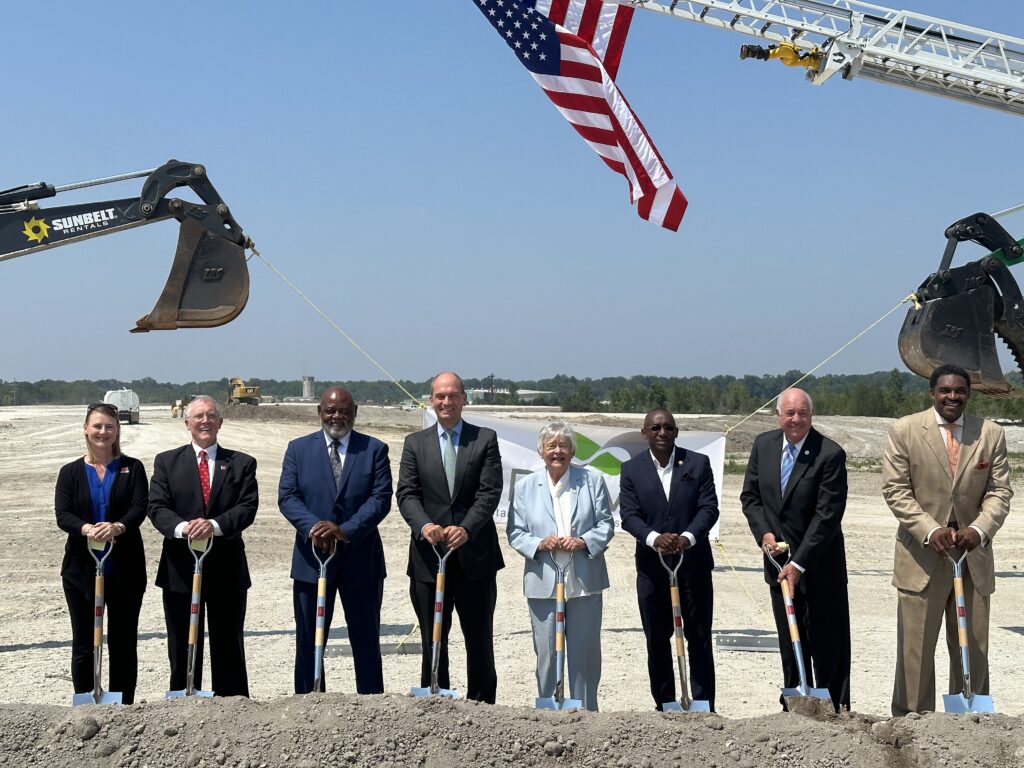
“Enviva,” Tucker said, “is the world’s largest wood pellet manufacturing company, and the University was the lead on recruiting them just five miles up the road, where they’ll utilize Port of Epes through a $375 million capital investment providing 350 direct and indirect jobs for our area and have a $10 million impact on the local economy.”
Under Tucker’s leadership, the University has carried the torch of recruitment in several capacities beyond college student recruitment. Much like Kevin Costner in the 1989 film “Field of Dreams,” Tucker has ultimately followed the mantra, “If you build it, they’ll come,” with the belief that what may be lacking in community development, UWA can help build.
University Charter School (UCS) is a critical piece—a corner piece, if you will—to the puzzle that Tucker has been working to assemble. The University sponsored the application and establishment of Alabama’s first rural public pre-K through 12 charter school, which Tucker began advocating for immediately upon assuming the presidency. The school opened in 2018 in Lyon Hall on the UWA campus, and its enrollment now exceeds 700, serving pre-k through 12th grade. Pre-k through third grade students are still at Lyon Hall, while fourth through 12th grades are housed at a separate campus within the larger UWA campus, a more-than $25 million facility with plans for continued expansion. But its impact presses much further, as evidenced by state and national recognition for innovation, educational outcomes, and model practices.
“UCS has exceeded all of our expectations, and it provides immeasurable opportunities to our community,” Tucker said. “We had to get our financial house in order to be able to sponsor the application and implementation of something as transformational as UCS has been. Their accolades are a testament to the viability and success of the school’s mission and values, proving year after year that the school is not only serving students and their families but doing so in a way that elevates them into the upper ranks of elementary and secondary education, particularly in the rural setting.”
NO BORDERS
There is a theme of embracing “rural” in the slate of achievements that will be regarded as part of Tucker’s legacy. In academics, UWA has launched its first two doctoral degrees in rural education and rural business, respectively.
“We were told we would never be able to offer doctoral programs, but these two programs have seen continued increases in enrollment, and they are designed to strengthen top leaders in education and business here in our region and beyond, focusing on the resources and challenges unique to rural communities,” Tucker said. “With the addition of these, the UWA campus sets itself apart in a very unique way. Individuals on our campus range from six weeks of age at our Campus School childcare facility, pre-k through 12th grade at UCS, then undergraduate through doctoral students enrolled at UWA. This represents a lifetime of learning that strongly reflects our mission.”
The two doctoral programs are among 30 new degree programs added at UWA during Tucker’s tenure, representing a fourth of the academic offerings. A wide range of programs are offered both on-campus and online, UWA having established itself as a force to be reckoned with in distance learning. This was most advantageous in 2020 when COVID prompted an instant pivot, the dividing line in Tucker’s 10-year administration.
“There are two words that come to mind when we talk about COVID and the years surrounding the pandemic. One is balance,” he said, “and the other is stress” he said with a smile.
“Our goal was to balance protocols in a way that kept people safe while also helping maintain a level of operations that allowed our students to stay on track,” Tucker said. “During that time, we were incredibly fortunate to have an already-robust approach to online instruction, so our transition went perhaps more smoothly than others. Because of that, we were among only 10 percent of universities in the nation who were able to return to face-to-face instruction that fall.”
Since then, UWA has bucked national trends to continue growing enrollment and adding new opportunities. UWA has been recognized for its diversity, which is bolstered by an international enrollment representing more than 40 countries. UWA’s efforts in growing international enrollment and enhancing cross-cultural experiences on campus began during Tucker’s tenure as dean. International students now comprise approximately 10 percent of the student body on campus at UWA.
WHAT’S NEXT
When the spring semester begins at UWA, Tucker says he will not be far away, but he will not be in a suit and tie, and the hand that has held a phone making him highly accessible for more than a decade will be holding something more refreshing.
“For the first couple of weeks, I plan to sit on the beach and take in sunsets,” Tucker said, smiling with a sense of relaxation. “I plan to decompress. You know, you need some downtime after you’ve been going 100 miles per hour for so long. I’m asked all the time what I’ll do, and I vacillate in my response.”
“Anyone who knows me knows that I have a list, and there are 18 things on the list, but at the top of the list is being a full-time grandparent,” said Tucker, now 71 with six grandchildren. “Although we are close, I’ve been so busy that I want to spend more time with them.”
Whether it’s the list of 18 plans or some activities he has in mind, there are plenty of options.
“I love to travel, especially internationally, and that’s on the list. I’ll probably pick up woodworking again,” he said, referencing his father’s woodworking tools and picking those back up—to see if he may “still have any skills.” A vegetable garden will be planted. He will also enjoy more socializing with family and friends.
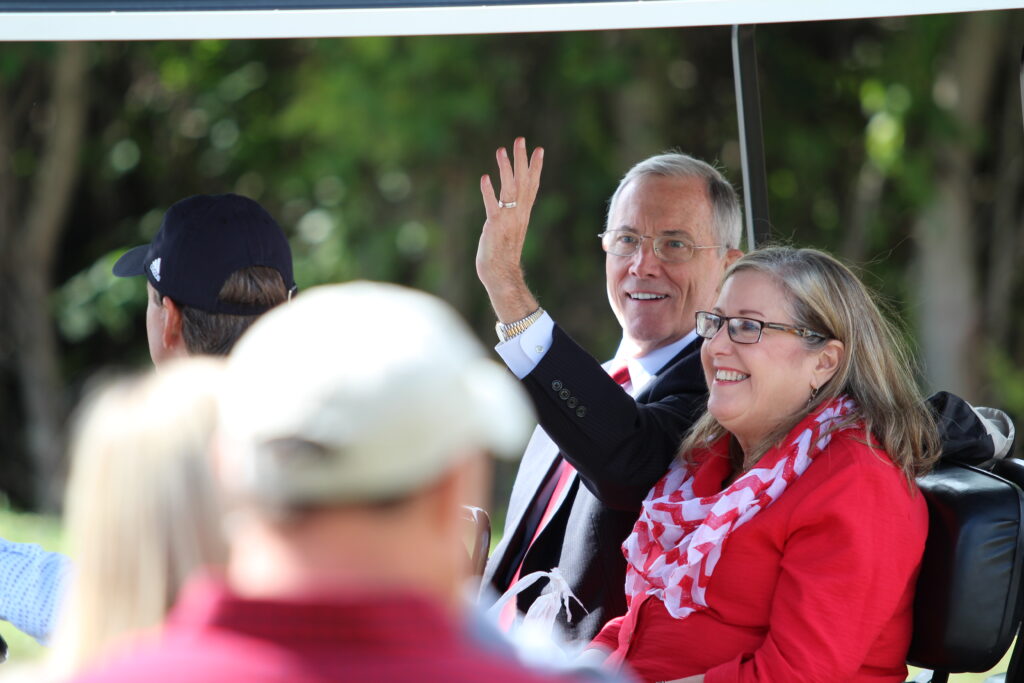
“Here’s one that’ll take you by surprise,” he said. “I’ll start training for the Senior Olympics.”
Somewhere in there, in between consulting and professional speaking engagements, he’ll dust off his chess board.
“That’s been my favorite game to play most of my life,” he recalls.
As pleased as he is with the achievements he’s led the 190-year old institution to over the past decade, Tucker clearly looks forward to his retirement and the next chapter for all that he hopes to accomplish in a different vein, maybe as simply as his favorite board game.
“Chess gets you to think forward, gets you to think strategically. I want to teach my grandchildren to play.”
So the time has come that this lifelong teacher steps away from the classroom, away from the conference room, and to the dining room table.
With a career as decorated and accomplished as his has been, nothing will top that next “checkmate.”
About KEN TUCKER
Ken Tucker is a lifelong west Alabama resident. Born and raised in Linden, and a long-time resident of Demopolis before moving to the UWA campus, he holds a B.A. and Ph.D. from the University of Alabama and an M.B.A. from the University of Alabama at Birmingham. His statewide service is a laundry list of some the most influential organizations in the region’s higher education and business landscape.
Tucker has served as chairperson of the Alabama Council of College and University Presidents and president of the NCAA Gulf South Conference Board of Directors. He has served on the Board of Directors of the Alabama CollegeCounts and Prepaid Affordable College Tuition programs, Alabama Higher Education Partnership, Alabama Small Business Development Consortium, Alabama Public Safety Leadership Academy, Alabama STEM Council, Alabama Women’s Hall of Fame, and the Marine Environmental Sciences Consortium.
His honors include the William E. Gilbert Award for Outstanding Teaching, membership in the UWA Society of the Golden Key, the Alabama Association for Higher Education in Business award for teaching excellence and professional contributions, and UWA’s Outstanding Business Faculty Award, the Rotary Club Paul Harris Fellow award, and Chamber Citizen of the Year honors. He served as chairperson of the Marengo County Commission and has received the Excellence in County Government Award from the Alabama Association of County Commissioners twice.
Tucker is married to Mary Murray Tucker and is the father of four daughters: Allison, Kimberly, Lara, and Rachel, and grandfather to Maggie, Leah, Taylor, Daniel, Kenzie, and Haley.
From the Archive
